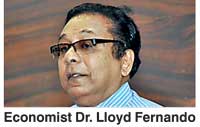Saturday Feb 21, 2026
Saturday Feb 21, 2026
Wednesday, 2 September 2015 00:02 - - {{hitsCtrl.values.hits}}
By Himal Kotelawala
A National Planning Council should be established in order to advise the Cabinet of Ministers on matters of economic policy, a leading economist advocated this week.
Speaking at a roundtable discussion on the United National Front (UNF) Government’s 5-Point Plan and its 10-Point Agreement with the SLFP, Senior Economist Dr. Lloyd Fernando said a National Planning Council comprising professionals from State institutions, the private sector and civil society organisations needed to be set up in view of what he called the complicated decision-making process associated with the ‘paradigm of development’ and the required coordinated approach.
The council, if established, should be headed by Prime Minister Ranil Wickremesinghe, he said, and its membership should comprise, inter-alia, ex officio members, renowned academics, researchers and representatives of various chambers of commerce and industry as well as professional associations.
Drawing parallels to the first-ever planning council formed under the late S.W.R.D. Bandaranaike and serviced by a Secretariat headed by the late Dr. Gamani Corea, Dr. Fernando said the council ought to meet at least once a month, chaired by the Premier himself, and should be serviced by a Planning Secretariat headed by a renowned economist.
“The Secretariat was later converted into a Planning Department, which finally came under the Ministry of Planning, with Dr. Corea as Secretary. The functions of the new Planning Secretariat could be performed by the present National Planning Department, which should, however, be strengthened through a thorough program of internal capacity building and co-option of competent staff from other organisations,” he said.
Responding to a question by the Daily FT, Dr. Fernando said many proposals made in the UNF manifesto were realistically achievable depending on the Government’s approach to them. He put particular emphasis on the proposed economic processing zones, reiterating that depending on the Government’s approach, they could prove practical and beneficial to the country’s economy.
“All those things can be made realistic if you approach them correctly. The only thing I don’t understand [about the manifesto] is that it also has something on astrology, which is a bit of a joke,” he said.
In his presentation at the discussion jointly organised by the Gamini Corea Foundation and the Marga Institute, Dr. Fernando spoke of the crucial need for a holistic approach to development, leading to a system of planning and implementation based on the principles of good governance and management for development results.
Commenting on the practical effectiveness of the much hyped good governance on actual growth development, Dr. Fernando said its principles, namely productivity, predictability, transparency, equity, vision and participation, emerge not merely as ethical or moral concepts but as technical imperatives of development.
Dr. Fernando further said the seven pillars of development (savings/investment, macro-economics, infrastructure, commodities and services, cross-cutting issues, education and health) must function in a coordinated manner, supported by the institutions of good governance, which provide the foundation.